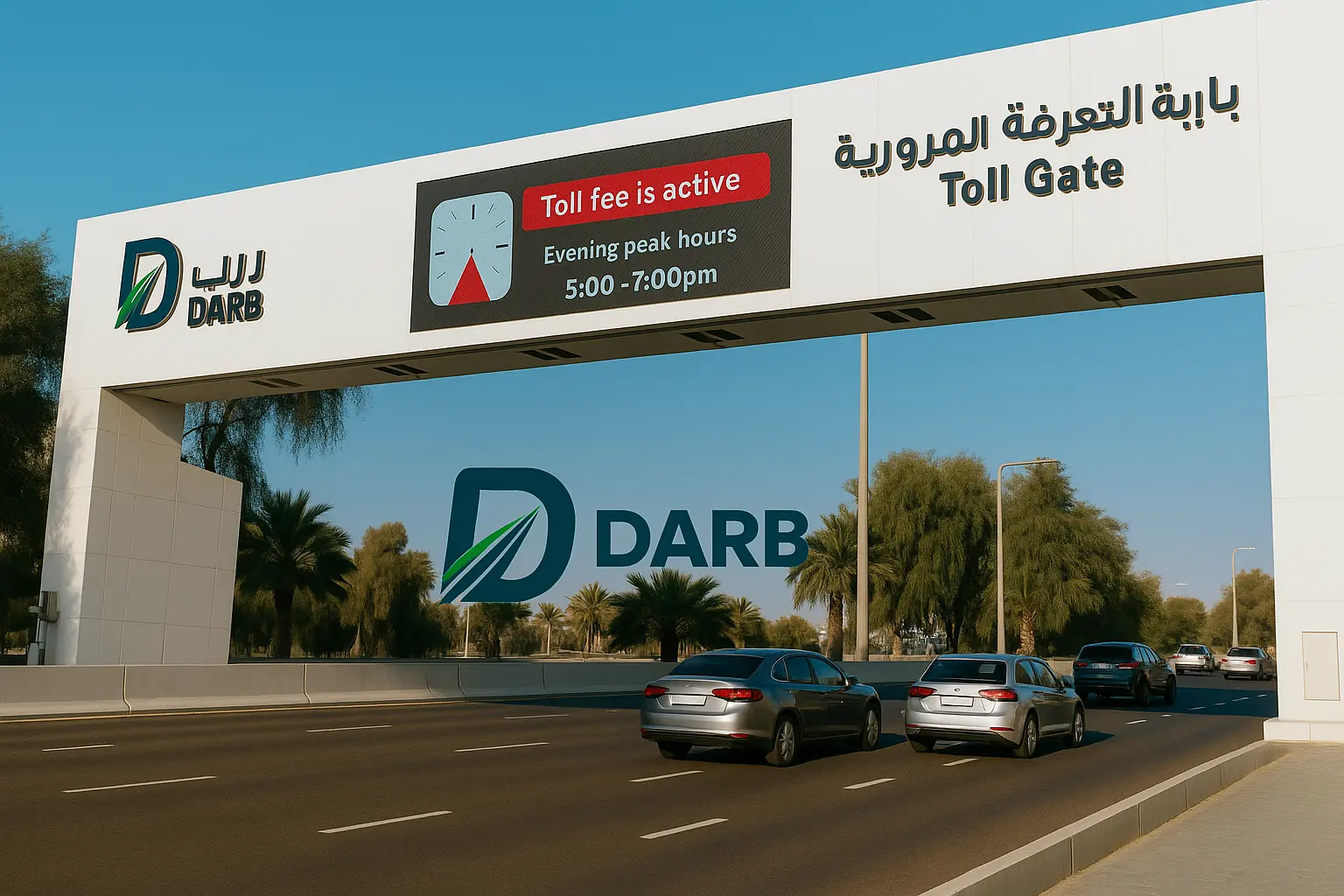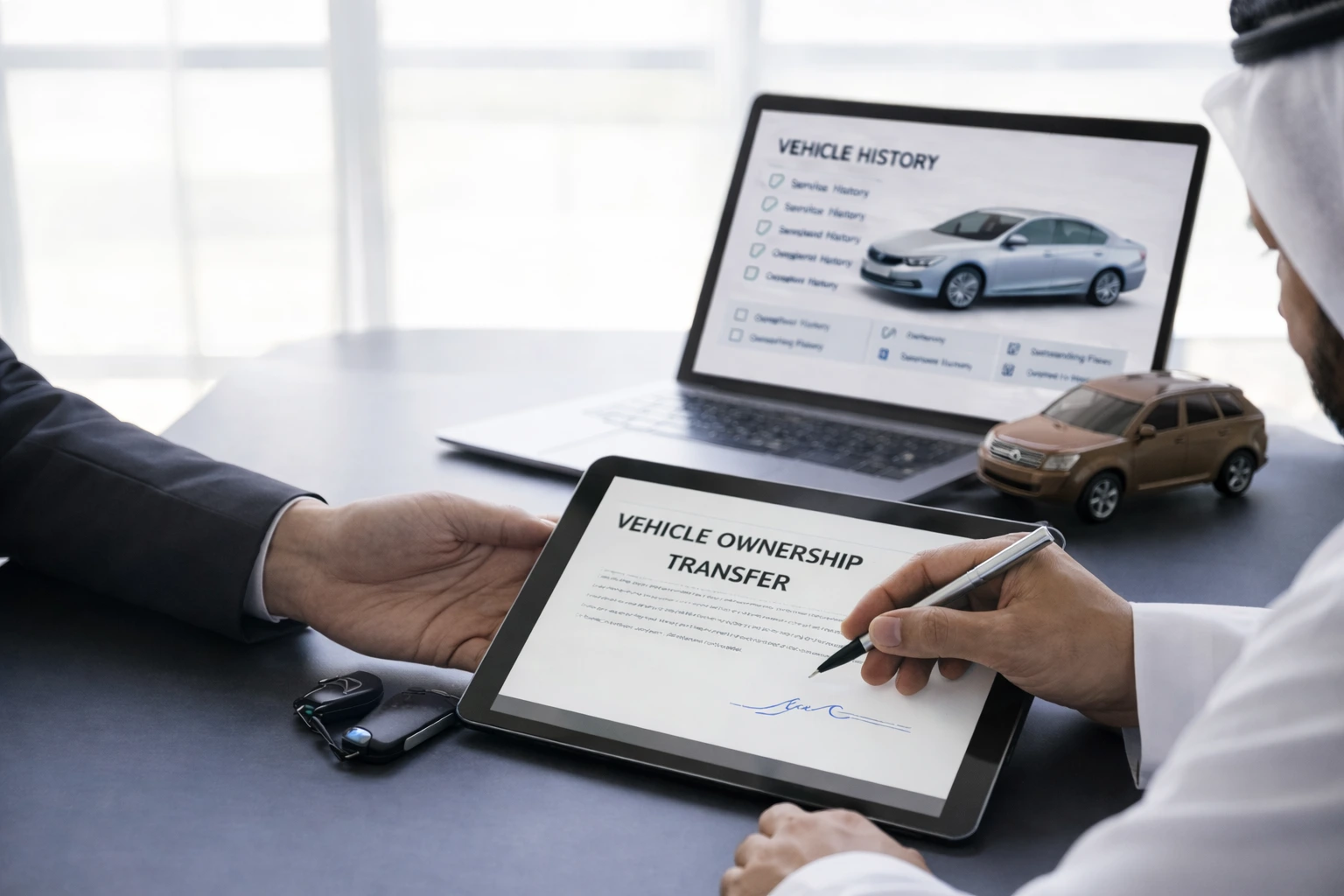The Darb toll gate system in Abu Dhabi charges drivers only at specific times of day. These toll charges apply during peak traffic hours on weekdays, while drivers can pass through freely during off-peak hours, weekends, and holidays.
Abu Dhabi introduced the Darb toll system to better manage traffic flow and get more people to use public transport. The system came into effect on January 2, 2021, under Law No. (17) of 2017, which the late Sheik Khalifa bin Zayed Al Nahyan issued.
The peak hours for Darb toll gates run Monday through Saturday in two time slots:
-
Morning peak hours: 7:00 AM to 9:00 AM
-
Evening peak hours: 5:00 PM to 7:00 PM
Drivers pay AED 4 each time they pass through a Darb toll gate during these peak hours. The system lets vehicles pass freely during non-peak times:
-
Between 9:00 AM and 5:00 PM on weekdays
-
From 7:00 PM until 7:00 AM the next morning
Drivers don't pay any tolls on Sundays and public holidays in Abu Dhabi. This setup helps reduce traffic during busy commute times while keeping roads free-flowing when traffic is lighter.
The Darb system changes its schedule during Ramadan. The modified toll times are:
-
Morning hours: 8:00 AM to 10:00 AM
-
Afternoon hours: 2:00 PM to 4:00 PM
The AED 4 toll fee stays the same during Ramadan. Daily charges won't exceed AED 16, no matter how many toll gates you pass through. This daily limit helps frequent drivers manage their costs while still meeting traffic management goals.
The system charges tolls only when roads are busiest. This smart approach encourages drivers to change their travel times or find different ways to commute without putting too much strain on their wallets.
Drivers need to register their vehicles on the Darb platform and keep enough money in their accounts to cover toll charges. The Integrated Transport Center (ITC) of the Department of Municipalities and Transport runs this system as part of Abu Dhabi's plan to make city transport more efficient.
When does Darb toll apply in Abu Dhabi?
The Darb toll system in Abu Dhabi runs on a smart schedule that helps manage traffic during busy periods. You'll only pay toll fees during specific peak hours, with some days being completely free.
Weekday peak hours
Abu Dhabi's Darb toll gates work on a time-based charging system. The toll fees apply only during rush hours from Monday to Saturday. These busy periods happen twice daily:
-
Morning peak hours: 7:00 AM to 9:00 AM
-
Evening peak hours: 5:00 PM to 7:00 PM
Drivers pay AED 4 each time they pass through a Darb toll gate during these times. This payment structure helps reduce traffic during the busiest commuting hours.
The good news is that you won't pay anything during off-peak hours on weekdays. Drivers can freely pass through toll gates outside these peak windows. The system caps the daily charges at AED 16, no matter how many times you cross the tolls in a day.
Ramadan peak hours
During Ramadan, the Darb toll schedule changes to match different traffic patterns and working hours. The fees stay the same, but collection times are different:
-
Morning peak hours: 8:00 AM to 10:00 AM
-
Afternoon peak hours: 2:00 PM to 4:00 PM
These new times reflect how people travel differently during Ramadan, especially since businesses often change their hours. The standard AED 4 fee per crossing stays the same.
Public holidays and Sundays
The Darb toll system offers free passes on certain days. You won't pay any tolls on:
-
Sundays: All toll gates are free all day
-
Public holidays: UAE holidays don't have any Darb tolls
The Department of Municipalities and Transport changed this policy in July 2022. The free day moved from Friday to Sunday. This change matched the UAE's new weekend schedule and started on July 15, 2022.
Sundays and public holidays are completely toll-free for the full 24 hours. This system helps reduce workday traffic while letting people travel freely on weekends and holidays.
The toll timings might change due to special events or government decisions. It's best to check the official Darb website or Abu Dhabi Mobility app before traveling to get the latest updates.
Where are Darb toll gates located?
Darb toll gates stand at every major entry and exit point to Abu Dhabi island. These automated toll collection points can only be found on the four bridges that connect Abu Dhabi's main island to the mainland.
You'll find the four Darb toll gates at these bridges:
-
Sheik Zayed Bridge - connecting Abu Dhabi island to the mainland on the eastern side of the city
-
Sheik Khalifa bin Zayed Bridge - linking the island to the mainland near Al Maqtaa area
-
Al Maqtaa Bridge - one of the older crossings providing access to the island
-
Mussafah Bridge - connecting the industrial area of Mussafah to Abu Dhabi island
The toll gates work in both directions and charge vehicles moving on and off the island. This setup means all bridge traffic follows the same toll rules, no matter which way vehicles travel.
These toll gates create a controlled boundary around Abu Dhabi island. The authorities can better manage traffic flow at these vital points. The Darb system targets congestion exactly where it builds up most.
The four locations have been up and running since January 2, 2021, as part of Abu Dhabi's traffic management plan. The city launched the toll system after studying traffic patterns and how people commute. By putting toll gates only on bridges, the system tracks almost all vehicles moving between the island and mainland.
Drivers heading to or from Abu Dhabi should know these four toll spots to plan their trips better. Understanding the toll points' locations helps drivers choose smarter routes and times, especially with the Darb system's time-based charges.
The toll gates spread evenly across major access points make the system fair. No bridge goes without a toll. This complete coverage shows Abu Dhabi's steadfast dedication to managing traffic on all major routes to and from the island.
How much does Darb toll cost?
Abu Dhabi's Darb toll system uses a simple fee structure with caps and penalties that help manage traffic and keep things fair for drivers.
Standard fee per crossing
Drivers pay AED 4 each time they pass through a Darb toll gate. This fee only applies during peak hours on weekdays - from 7:00 AM to 9:00 AM and 5:00 PM to 7:00 PM, Monday through Saturday. The system automatically takes this amount from your registered account when your vehicle goes through any of the four toll gates. You won't pay anything during off-peak hours, Fridays, Sundays, or public holidays.
Daily and monthly caps
The Darb system protects regular commuters from paying too much. Your daily charges won't go above AED 16, no matter how many toll gates you pass. The monthly limits change based on how many cars you register under one account:
-
First vehicle: AED 200 maximum per month
-
Second vehicle: AED 150 maximum per month
-
Each additional vehicle: AED 100 maximum per month
You can change the order of your registered vehicles in the system, and these changes take effect next month. This setup really helps families with multiple cars since each extra vehicle gets a lower monthly cap.
Fines for violations
The system uses clear penalties to make sure everyone follows the rules. Here are the four types of violations and their fines:
-
Unregistered Vehicle: Your first violation costs AED 100, the second jumps to AED 200, and third or later violations cost AED 400. The system gives you 10 days from your first passage before any penalties kick in.
-
Insufficient Balance: Non-Abu Dhabi vehicles get an AED 50 fine if they don't have enough money in their account after 5 days.
-
License Plate Tampering: Trying to avoid tolls by messing with your license plates will cost you AED 10,000.
-
Equipment Damage: Breaking toll gates or payment machines also means a AED 10,000 fine[144].
The rules put a ceiling on these fines. A single violation can't cost more than AED 10,000, and your total fines for one vehicle can't exceed AED 25,000 per year.
How to register and pay for Darb toll?
The Darb toll system needs a simple process to set up an account, add funds, and keep enough money for toll crossings.
Creating a Darb account
Motorists need a valid Emirates ID, an active email address, mobile phone number, and vehicle's license plate details to register for the Darb toll system. The official Darb website or mobile app on iOS and Android platforms makes registration accessible to more people. The process requires users to:
-
Select "Individual" under the Create New Account section
-
Enter and verify email address via one-time password (OTP)
-
Choose the emirate where the vehicle is registered
-
Enter the traffic code number
-
Verify mobile number through SMS verification
-
Create a password to complete the account setup
The next step requires users to select "Register Vehicle" on the dashboard and enter their vehicle details. Each vehicle needs a one-time registration fee of AED 100, and the system credits AED 50 to the account as starting balance.
Topping up your wallet
The Darb platform gives users multiple ways to add funds for toll crossings. Users can top up their wallet from several places:
-
Through the dashboard - click the "Top-up" button near the wallet name
-
Via the "Vehicles" section - select the specific vehicle and find the top-up option
-
From the profile page - access through the user name in the top corner
Users should check their balance regularly to avoid penalties, since the system takes fees automatically during operational hours at toll gates.
Payment methods available
UAE residents can pay Darb toll fees in several ways. Credit or debit cards work directly through the Darb platform. Abu Dhabi Islamic Bank (ADIB) stands out as the first UAE bank that lets customers add money to their Darb wallet through mobile and internet banking. ADIB customers can log into their banking app, go to Payments, select Toll Payment, add Darb as a beneficiary with traffic number details, and finish the transaction.
Darb kiosks and customer service centers across Abu Dhabi provide additional payment options for users who prefer in-person transactions.
Who is exempt from Darb toll and how to apply?
Abu Dhabi's Darb toll system provides toll exemptions based on vehicle types and citizen groups. The system recognizes two types of exemptions: automatic ones that don't need applications and others that require formal requests.
Automatically exempt vehicles
Several vehicles don't need to pay Darb toll fees because of their purpose or classification. These categories don't require any application:
-
Emergency vehicles (ambulances, armed forces, civil defense) with official logos and numbers
-
Police vehicles from Abu Dhabi, Ministry of Interior, or other emirates
-
Public transport busses and authorized Abu Dhabi taxis
-
Motorcycles
-
Authorized school busses by the Integrated Transport Center
-
Passenger busses with capacity for 26 or more passengers
-
Trailer vehicles
These vehicles can freely pass through toll gates without charges. The system doesn't require their registration.
Exemptions by request
The system allows four specific groups to request toll charge exemptions:
-
Senior citizens (aged 60 and above)
-
Retired citizens
-
Families with limited income
Each eligible person can register only one vehicle for exemption across all categories. The system automatically applies exemptions to Abu Dhabi-registered vehicles after approval. Notwithstanding that, vehicles from other emirates must apply manually through the Darb platform.
Steps to apply for exemption
Getting an exemption requires these simple steps:
-
Register for an account through the official Darb website or mobile application
-
Access the exemption request section within your account dashboard
-
Select the appropriate exemption category (People of Determination, senior citizen, retiree, or limited income)
-
Upload all required supporting documents to verify eligibility
-
Submit the application and wait for review
The exemption applies to one registered vehicle only. Abu Dhabi's Integrated Transport Center processes these applications to support vulnerable groups while managing traffic effectively through the Darb timing system.





